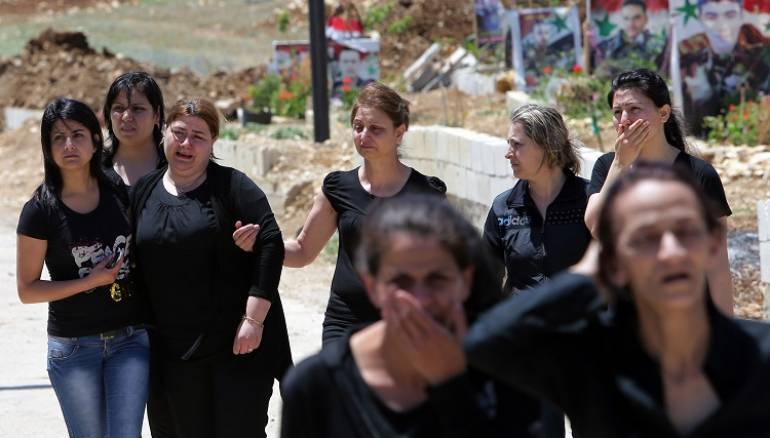Umm Hassan, a woman in her seventies, walks in an apple orchard, inspecting the miserable conditions. She circles the orchard, remembering a day when it had been ripe with life and she could hear the sounds of her sons Ali and Mohamed digging around the trees to fertilize them, or trimming and pruning the branches. Umm Hassan looks over the orchard and mourns: “Forgive us… the young men who were tending you are gone. Even you have not survived the war… even you.”
Umm Hassan never thought that she would go back to working the land after her sons grew up. As she puts it, this simple villager thought that life had transferred her to retirement and rest. But she later discovered that it was a short vacation.
Umm Hassan knows nothing about the war except that it robbed her of what was most important to her in life, her sons. She told us that in this small, sleepy village in the Latakia countryside, there are four or five other women like her. She tells us that the disaster caused by the war has even affected this small village, far away from the air raids, mortars and clashes. Umm Hassan says: “Here we say, ‘the livelihood goes with its earner.’ Looking at the trees shows us the truth of this expression. Since the departure of my sons, the land has been neglected, as there is no one left but my young son, Hassan, who cannot work alone on land that before, three brothers were working together. So I sometimes try to help him.”
Umm Wassim’s story is similarly painful. She has also been forced to return to her old work after the death of her son Wassim, who left behind him a family comprised of a mother, his wife, and two small children, without a breadwinner to help them remain steadfast against the demands of life.
Umm Wassim speaks to us as she sits behind a sewing machine, saying: “After I grew a little older, my eyesight weakened, and sewing got hard. At that time, Wassim stopped me from working and put the machine in the shed. But after he died, we no longer had a breadwinner, so I returned to work. It may be hard for me and on my health, but what choice is there? To die of starvation? Of course not. Because of the deterioration of the economic situation, sewing has nearly gone back to a previous era. People have started resorting to sewing to fix their clothes and to make new clothes because they are cheaper than readymade goods.”
The stories of Umm Hassan and Umm Wassim sum up the disastrous situation that has occurred on the Syrian coast. Although before the war women joined men in a number of activities, especially agriculture, the war and the loss of many men has put women in Syria and particularly women on the Syrian coast under a fait accompli that has pushed them to work double and to take the place of men almost entirely.
A little further from Umm Hassan and Umm Wassim, in one of the villages of the al-Duraykish countryside, Maram is waiting for any news that would shed light on the fate of her fiancé Firas, who, five years ago went missing fighting against rebel groups on the front lines.
Maram says: “Firas and I had been in love for a few years when he proposed to me. After he graduated from fine arts school, Firas tried hard to leave the country, but all the doors were closed for him. One day, he was arrested and put into compulsory service. After a few months, his barracks were attacked and Firas disappeared. Some of his friends claimed to have seen his corpse, and others said he was captured. Five years and four months have passed since then, and I’m still waiting.”
Maram is not the only one to live in pain and hope. Many women on the Syrian coast are enduring similar situations, waiting for the return of their loved ones who were lost during a battle and whose fate is unknown. It appears that the Ministry of Reconciliations in the Syrian government is unable to clarify what happened to these people, whether captured or lost, who now number in the thousands.
Suhair told us that she went back to the Ministry of Reconciliations in Damascus more than 10 times, and every time they told her that there was progress in the file of her husband, who had been working as a petroleum engineer in the oil fields in Palmyra and was lost when clashes erupted there. Suhair tells us: “I sometimes feel that I just go to the Ministry of Reconciliations to listen to their promises and load up with hope. But even the hope itself is sometimes painful. My situation is similar that of many women and families who know captured or missing people and who you see going back to the Ministry with no choice but to wait and to hope.”
Most residents of the coast publicly stand with the Syrian authorities, and many have been killed fighting alongside the authorities, whether in the army or in the security branches or allied militias. The number of men lost is over than 125,000. In the end, the women of the Syrian coast are the ones who pay the biggest price, as the war has taken their men as fuel for its fire.
This article was translated and edited by The Syrian Observer. Responsibility for the information and views set out in this article lies entirely with the author.


